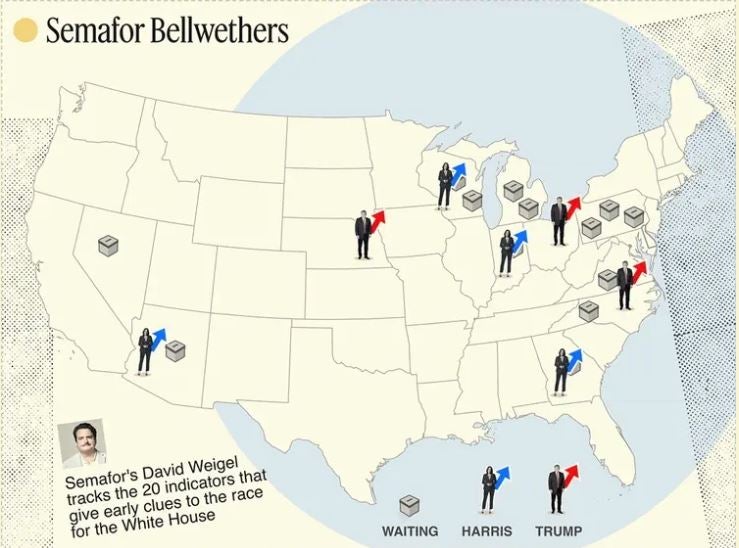US election: Grassroots political reporting back in fashion says Semafor’s Ben Smith

Given the fact pollsters got the the 2016 and 2020 US presidential election results wrong, Semafor co-founder Ben Smith believes old-fashioned journalistic methods are coming back into fashion.
He told Press Gazette on Monday: “The kind of people who made fun of going to diners and talking to Americans about what they’re thinking are now kind of wondering what Americans in diners are thinking. And so I do think there’s a full circle there.”
Semafor’s coverage of the 2024 US election focuses around on-the-ground reporting from bellwether regions in the belief that this will provide early indications of where the election is heading.
The site’s political reporter David Weigel has picked 20 counties that Semafor will report on as bellwethers starting with Terre Haute in Indiana. Over election night Semafor will fill in its bellwethers map to provide a point of difference in its reporting. In an election that may not be called for days, these votes could also provide an early indication of who has won.

Launched two years ago, Semafor is a free news website which makes its money from advertising and events and aims to provide a more global view. Its coverage is a mixture of original reporting and analysis (which is combined in the same article, so that reporters share their view as a postscript about what each story means).
In a polarised US media scene where even staying neutral can have harsh consequences (as The Washington Post and Los Angeles Times found out in recent weeks) Smith believes Semafor’s non-partisan coverage has been well received.
“We’ve fought really hard to be open to different perspectives, not just wire service neutral. And we’ve had a lot of conversations with central figures.
“We’ve interviewed Trump three times and he only stormed out once, which I think is a good ratio…
“I think people feel like we’re accurate and trustworthy and fair, and that in the US is obviously a pretty hard place to hold, and we’re really proud of that.
“I do feel like there’s a sizeable number of readers who are really exhausted by the sense that the media, and social media in particular, have become expert in manipulating your emotions and that when you click, when you can’t turn off the cable channel, it’s essentially because they’re manipulating you and telling you what you want to hear, or scaring you.
“I think people increasingly want to understand what’s happening and are looking for something different.”
Semafor has had a strong year commercially
Asked whether it has been a good election for Semafor commercially, he said: “We’ve had a really strong year. If you told me two years ago this is where we’d be, I’d be pretty happy.”
He noted that the big commercial winners on advertising for the election will have been network TV affiliate stations in swing states and the tech giants delivering targeted local advertising: Tiktok, Meta and Google. But he said Semafor has seen some uptick in advertising on newsletters.
Semafor recently reported on an internal townhall-style meeting at The New York Times which included journalists airing concerns that coverage was “sanewashing” Donald Trump, so failing to highlight his more outrageous statements.
Asked whether US media has got coverage of Trump right this time, former New York Times media reporter Smith said: “I think the media is always sort of fighting the last war and learning the lesson of the last cycle.
“One of the lessons at one point was seen as being, you can’t just give this guy your platform and print whatever outrageous thing he says to get attention.
“And I think there was an overcorrection and then suddenly Democrats actually were like ‘wait, wait, he’s saying a bunch of unpopular things, why aren’t you telling your audiences about it?’
“He does present a challenge with his core style which is to say something outrageous so that he gets scolded by the media, so that he can turn to his followers and supporters and say ‘see, they hate me too’…
“I think there’s a tendency sometimes in the media to overestimate the new, to sort of arrive within the future a little before the future actually gets here.
“I think if Harris wins, we’ll look back and say we sure spent a lot of time talking about Joe Rogan and about young men who didn’t wind up voting, and we didn’t really cover the kind of middle-aged and older white women and what media were they consuming.”
Political reporting has come ‘full circle’ after over-reliance on polls
Asked about whether the US media has become too obsessed with reporting on opinion polls, rather than on the political issues which divide the candidates – a concern raised during the UK election earlier this year – Smith said: “I was coming up as a political reporter in like 2004 and 2008, there was among political journalists and among readers on blogs and in social media huge disdain for qualitative journalism; the kind of journalist who saw their job as talking to thousands of people around the country, travelling a lot, and trying to explain to readers in Washington or New York or wherever kind of what was the sense of the country.
“That was really replaced by the new technologies: increasingly sophisticated polling and the aggregation of polling and looking at Twitter, either by injecting it directly into your veins, or by doing sentiment analysis.
“It is just a matter of fact that in the last two US presidential contests, the polling averages have been badly wrong…
“I think having real expertise is now back in fashion and the kind of people who made fun of going to diners and talking to Americans about what they’re thinking, are now kind of wondering what Americans in diners are thinking”
Email pged@pressgazette.co.uk to point out mistakes, provide story tips or send in a letter for publication on our “Letters Page” blog
Related
Trudeau says Canada will issue 25% tariffs on $155B of…
'The Bottom Line' panelists Lee Carter and Liz Peek give their take on President Donald Trump confirming the 25% tariffs. Canadian Prime Minister Justin T
Cartel Violence Kills American Citizen In Brutal Fashion. Will Trump…
PublishedFebruary 25, 2025 4:34 PM EST|UpdatedFebruary 25, 2025 4:35 PM ESTFacebookTwitterEmailCopy LinkAn American citizen is dead after a cartel-linked bombin
Luxury Briefing: Tapestry, Capri and the American fashion portfolio shakeup
In this week’s Luxury Briefing: The fallout from the failed Tapestry-Capri merger continues, with Tapestry selling Stuart Weitzman and Capri reportedly eyeing
Liz Truss tells CPAC UK is ‘failing’ and needs Maga-style…
Liz Truss, the former British prime minister, told a rightwing conference in the US that her country was “failing” and needed a Donald Trump-style “Maga�













